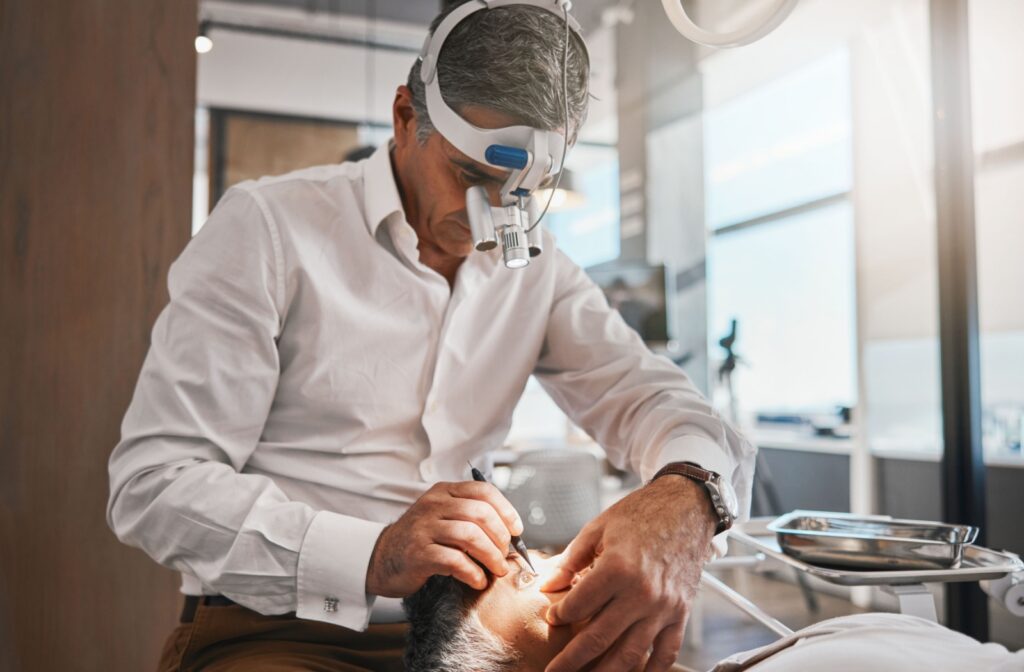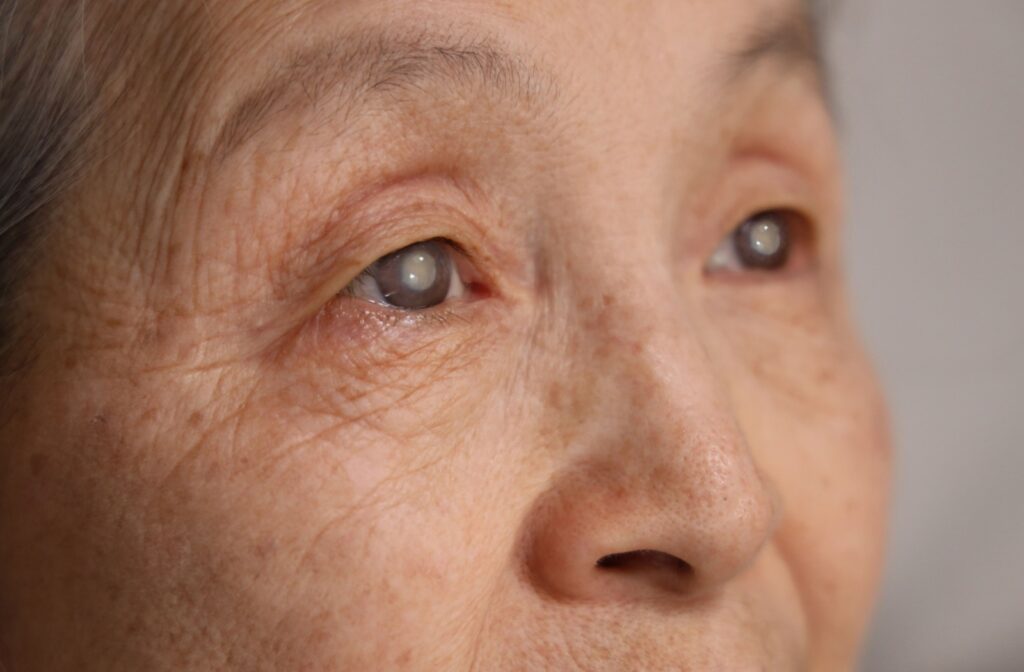Cataracts and dry eyes are common eye conditions that most people experience at some point in their lives. Although they might share overlapping symptoms, they’re each distinct conditions that require their own approach to treatment.
No, cataracts don’t cause dry eyes. They can, however, cause pre-existing dryness to worsen, especially following cataract surgery.
Dry eye therapy can help manage dryness, prepare for your upcoming cataract surgery, and promote solid healing.
No matter the eye concern you’re experiencing, routine eye exams can make a significant difference. These exams help identify the root cause of your symptoms, devise a treatment plan, and monitor its progression for timely intervention, whether that’s dry eye therapy or cataract surgery.
Cataracts vs Dry Eyes
Given the complexity of our visual health, it’s not unusual for distinct eye conditions to present at the same time. Take cataracts and dry eyes, for instance. As cataracts progress, symptoms become more noticeable, making pre-existing dry eye symptoms more obvious and irritating.
What are Cataracts?
Cataracts are an eye condition that develops gradually, usually as a natural part of growing older. Cataracts cause the lens of the eye to become cloudy, making it difficult to see clearly.
It’s comparable to looking through a foggy or hazy window; while you make out subtle shapes and colors, noticing fine details is challenging. Cataracts can lead to blurry vision, difficulty with night vision, or greater sensitivity to light.
At first, when cataracts begin to develop, symptoms might feel subtle and easy to manage. However, as time goes on and the cloudiness intensifies, cataracts can significantly affect your ability to perform everyday tasks.
Fortunately, cataracts are one of the few eye conditions that we can entirely treat, thanks to cataract surgery. This is a simple procedure that replaces the cloudy lens with a clear, artificial one, effectively restoring vision.
While effective, cataract surgery can also affect the eye’s surface, which ties into the topic of dry eyes.
What are Dry Eyes?
Aside from helping you express emotions, your tears have a functional role in your eye health. They protect your eyes from irritants and debris and hydrate the surface of your eye, thereby keeping you comfortable. However, when certain factors cause instability in the tear film, dry eyes can develop.
Dry eyes occur when the eyes can’t produce enough tears or the right quality of tears to lubricate themselves properly. This can leave your eyes feeling gritty, itchy, or even like there’s something stuck in your eye. Other dry eye symptoms, which overlap with cataracts, include blurry vision and light sensitivity.
Given dry eyes’ chronic nature, there’s no permanent cure, but you can effectively improve symptoms and experience long-term relief through proper management.
Do Cataracts Cause Dry Eyes?
The short answer is no, cataracts themselves do not cause dry eyes. However, there are scenarios where the two may overlap, particularly after cataract surgery.
Post-Surgery Dry Eye Symptoms
Although cataract surgery is safe and effective, it can sometimes lead to temporary dry eye symptoms.
During the procedure, the surface of your eye (the cornea) may be affected, disrupting tear production of the tear film itself. The surgical incision can temporarily reduce your eye’s ability to maintain proper moisture levels.
Fortunately, post-surgery dryness is usually temporary and manageable with prescribed eye drops or dry eye therapies.
Common Age-Related Factors
Cataracts and dry eyes often occur simultaneously in older adults, primarily because both conditions are age-related. Tear production naturally decreases with age, and cataracts develop naturally as part of growing older.
This overlap creates the misconception that cataracts directly cause dry eyes, but in reality, they simply coexist because of aging.
Other Contributing Factors
Certain medical conditions, medications, and environmental triggers can contribute to dry eyes and cataracts, creating an indirect connection.
For example, people with diabetes or those living in dry or windy environments may experience both eye conditions simultaneously.

Why You Might Feel Dry Eye Symptoms Before Cataract Surgery
Interestingly, some people notice dry eye symptoms appearing before cataract surgery.
This often happens because cataracts lead to greater light sensitivity, making existing dry eye symptoms more apparent. Besides, if it’s time for cataract surgery, it’s likely that the condition has advanced to where it’s affecting your daily life.
Managing dry eyes before surgery is incredibly important, since dryness can affect the accuracy of measurements necessary for your artificial lens.
Managing Dry Eyes Before & After Cataract Surgery
The good news is that you can tackle dry eye symptoms before cataract surgery, for a seamless procedure and healthier visual outcomes. Here’s how
Before Surgery
- Comprehensive exam: If you notice dry eye symptoms, communicate this to your eye doctor during your routine eye exam and your cataract evaluation. We’ll assess the severity of your symptoms, the quality of your tear film, and your tear production to develop a dry eye therapy plan to support you.
- Dry eye therapy: Managing dry eyes before cataract surgery supports healthier visual outcomes post-surgery. Not to mention, if you have severe dry eyes, your surgeon might hold off on the procedure altogether until your symptoms improve. Treatments may include artificial tears, prescription eye drops, or lifestyle changes.
After Surgery
- Prescription eye drops: After surgery, your surgeon prescribes a sequence of medications to promote a smooth recovery. These typically include lubricating eye drops or artificial tears to keep your eyes hydrated.
- Follow-up care: Your surgeon and eye doctor work together to monitor your post-surgery health and visual outcomes. They can help you manage and address any dryness following surgery to promote healthy healing.
Take the Next Step Towards Healthier Eyes
If you’re experiencing dry eye symptoms or suspect you have cataracts, visiting your optometrist for a routine eye exam for a thorough evaluation is a necessary first step. Early diagnosis and timely treatment can offer relief, help prevent complications, and keep your vision sharp.
Supporting your vision and eye health extends beyond updating your vision prescription. Connect with our Total Vision Campbell team to schedule your routine eye exam today!



